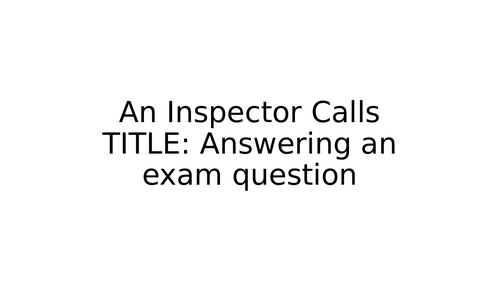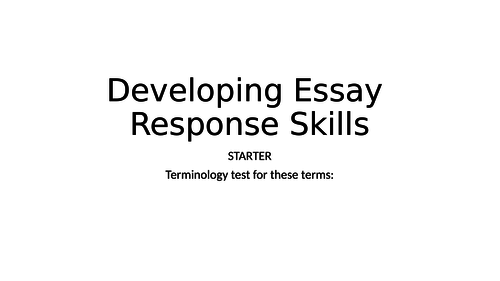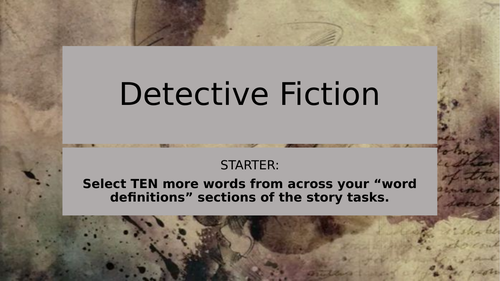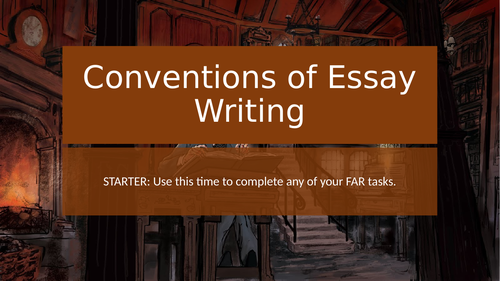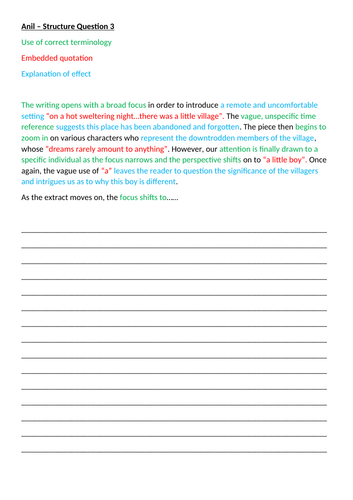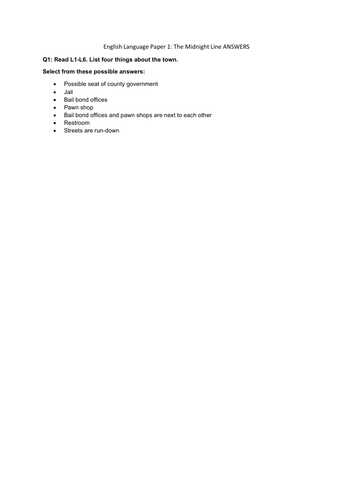
228Uploads
564k+Views
1399k+Downloads
English
Sale

AQA English Literature: An Inspector Calls essay building lesson
A lesson that models the process of building a high-end An Inspector Calls essay. Please note, the lesson assumes that the class has read the play and has attempted versions of the AQA English Literature questions already. Also, the lesson works best as an aspirational example: I concentrate on using sophisticated language to shape my points, and focus on integrating appropriate references. Please note I’ve deliberately left some academic “gaps” too - this model response is a high-quality response, but there are other avenues of academic insight that can be taken.
Bottom line, to get the most out of this lesson, you’ll need to spend a little time going through it all first - hence the low price.
Sale

AQA English Literature: Romeo and Juliet Method Focus Essay Builder
Similar to a lesson I posted on A Christmas Carol. After a bit of a warm-up, the crux of the lesson is focused on establishing concepts then explicitly showing students HOW to identify methods - again, some still confuse quotations and methods - before pointing them at an exam question.
UPDATE: I repeated this lesson a few weeks later with a different extract, but backing off a notch in terms of explicitly identifying methods.
Sale

AQA English Literature: A Christmas Carol Method Focus Essay Builder
My year 11s were STILL struggling with how to frame a method, so I came up with this stand alone lesson. The idea is that, having reviewed the slide where the methods are explicitly identified, the students will see that a method and a quotation are not the same thing.
This was a successful lesson.
UPDATE: I repeated this process with a bottom set year 10 class where I was even more specific. This was also a successful lesson, so I’ve included it.
Sale

AQA English Language Paper 1 Resources - based upon 100% Perfect Girl
A few things first: the mock exam can be found elsewhere on in my resources and I base the lessons off a similar series of lessons focused on Anil. The difference here is that these lessons are very much targeting higher ability students - all of the success criteria draws from the top end of the mark criteria.
I found this series of lessons to be really useful as a way of establishing the skills required to answer each of the Section A questions. The lessons focus less on exam strategy and more on understanding what is required in relation to each question. The kids found it useful.
Sale

AQA A-Level English Language and Literature - Introduction to Poetry (Heaney)
My introduction unit for A-Level Language and Literature. It assumes that the academic voices of the students needs sharpening somewhat. I source a lot of stuff from various corners of the net and use it in the power points - pay particular attention to the notes element of the power points by the way. I also include a “model essay” the purpose of which is to get the students to move away from their formulaic essay structures that they have used in their GCSEs.
Think of this as a starting point that may need a little shaping to suit the needs of your class.
Sale

KS3: SPaG Understanding a Text Lessons (Using Michael Grant's "Gone" series as a stimulus)
SPAG lessons can get a little flat at times. These are the worksheets I’ve designed to use with my own SPAG group. It is designed to be taught in tandem with a Dystopian Fiction SoW that ends with a reading assessment. Specifically, these lessons focus on an extract taken from Michael Grant’s “Gone” - all extracts taken from the first chapter. The aim is to develop an increased understanding of each text through the asking of more and more complex questions. The tasks can be sat as part of a lesson (I reckon they’ll take most groups between 10-30 minutes depending on the groups setting), or make ideal homework and/or extension tasks.
At the moment, the resources are set up to be taught to lower set year 7 students. But, it won’t be too hard to change the tasks to more suitable ones for any set.
UPDATE: I’ve included some versions that are more suited to be printed out. They have some basic RAG feedback grids on the back with some generic targets.
Sale

Punctuation vs Teachers: Tracking punctuation skill progress and making it fun(ish...)
A series of activities that are designed to be taught over time. There is a bit of initial leg-work to do in setting up the spreadsheet and, truth be told, I’ve had more success using this with smaller classes than with larger ones - the volume of specific data generated gets unwieldy with the larger groups.
So, I’ve divided punctuation up into three groups - BASIC, MID-RANGE and ADVANCED. The idea is that you teach/go over/re-demonstrate the type a type of punctuation. Then, the students are given ten minutes to write where they focus on using that type of punctuation. Each punctuation type has a points value, and the goal is to “defeat” a possessed teacher by using that type of punctuation. The powerpoint presentations each show a teacher (or a combination of teachers) making their way across the screen over the course of ten minutes. There’s the option of spooky orchestral music too.
There are specific work sheets that each student will need - each work sheet contains the points value of each punctuation type and a grid where you can wither self/peer/teacher assess depending on how you want to set the lesson up.
As the class progresses, so to does the complexity of the task. Each new level incorporates a new type of punctuation OR (more importantly) a new combination of focuses. For example, level 3 requires students to use BASIC and MID-RANGE punctuation to defeat two teachers.
What I found useful was the specific nature of the feedback I got: I could see quite clearly which punctuation types were defeating each student and which punctuation type was an issue for the class as a whole. And, if the class lost (which they did on more than one occasion) then they retried the level the following week.
We used this in SPAG lessons in combination with some other elements - it can easily be made into a whole lesson.
A useful little tool…
Sale

AQA English Language and Literature: Developing essay response skills to the Paris Anthology section
This is my attempt to engage and develop my Year 12s academic voices in their Paris Anthology related essay responses. The main issue my class had seemed to focus upon when and where to start. What I do is show them how they can place a particular emphasis on one of several potential areas of focus initially. I show them how they could use Mode, Audience, Purpose, each of Grice’s Maxims and each of the different levels of language as a starting point for an analytical response. The attached word document appears to be an “essay”.It isn’t. It’s the collected starting points placed in one document so that the students can focus more on the “how you do it” instead of trying to copy down the best bits.
It worked reasonably well and is suited for a class with similar needs. Hope you find this useful.
Sale

KS3: Detective Fiction - Sherlock Holmes. Workbook included. Reading and Writing SoW.
A thoroughly enjoyable unit of work. Built around a work booklet and designed for that awkward half-term at the end of the year where you don’t want to give out new exercise books.
The workbook contains a copy of The Norwood Builder, comprehension questions and vocabulary list, as well as a variety of activities that focus (primarily) upon creative writing skills with some language and structure based tasks.
The lessons are designed to be used with the workbook.
NOTE: I may upload a slightly different workbook in the future, but I will leave the original on here.
Sale

AQA English Language Paper 2 Section A Resource pack: Jack the Ripper vs Zodiac Killer
A set of resources designed to engage year 11s with English Language Paper 2 Section A. I shaped the lessons around the articles written surrounding the time of Jack the Ripper, and around an article published following the Zodiac Killer sending a letter to the San Fransisco Chronicle.
The class were fascinated by these articles - I had students independently going away and reading pre-19th century newspapers off their own backs! This will need to be taught delicately though - the content is graphic in nature, so be sure that your class has the necessary level of maturity to access this material without being distracted.
Sale

AQA English Language P2: Section B (using A Christmas Carol)
A series of lessons designed to make sure students have a clear understanding of the “basics” and the “developed” skills and techniques required for EACH of the possible text types they could meet in Section B of the English Language Paper 2 exam. Because my lot were taught A Christmas Carol (and I was trying to kill two birds with one stone by revising this at the same time…), the tasks are all focused on writing within the world of Scrooge. To that end, they may require some editing on the part of the user - hence the reduced price.
Bundle Sale

AQA GCSE Curriculum
Every scheme of work that I’ve made that could be used to teach AQA English Language and AQA English Literature
Sale

AQA: Year 9 Intro to English Language Paper 1 + Workbook
A variation on a selection of lessons that I sell elsewhere. Here, the center piece is a 26 page printable workbook that runs in tandem with the power-point lessons - ideal for a Summer Term 2 unit of work where you are reluctant to give the students a new work book, and working on paper is problematic.
The text is Anil (from the old Sunlight on the Grass Anthology) and there is about 12 lessons worth of material here.
Sale

AQA English Language Paper 1: Brighton Rock
A deconstruction of the English Language Paper 1 examination that uses Brighton Rock as a source. I’ve lifted the model material from the mark schemes and there’s FAR related targets included. Essentially, this is a lesson that can be taught either AFTER the students have sat the exam and you want them to peer/self assess, or you could change it so that that they answer a question and then mark their efforts.
The Section B element is a bit of an experiment - peer marking creative writing is always a challenge. So I’ve given the students a series of yes/not/some related questions. The idea is that they “tick” the level next to the answer on a copy of the AO5 and AO6 mark schemes. Using that, they should be better able to work out where the creative writing fits. My peer marked creative writing has got much more accurate as a result of this.
Sale

AQA English Language Paper 1 MOCK EXAM: The Midnight Line (Jack Reacher)
I’ve used the opening chapter of the novel as the basis for an AQA Language Paper 1 mock exam. I’ve created an Answer paper too.
Sale

KS3: Born a Crime - Structure Focus
A lesson take from a collaborative scheme of work. The lesson focuses on the quite excellent Born A Crime by Trevor Noah. The focus is developing an initial understanding of South Africa, then Trevor Noah himself, before focusing in on the context surrounding the story itself.
After, the focus switches to analysing the structural choices made in the extract.
Additionally, I’ve included a useful little follow up lesson where the focus ins to build a piece of creative writing that follows a specific structural path.
Sale

AQA Power and Conflict Poetry True or False Statement Generator
A useful little resource that can be a starter/plenary element in your lessons. The spreadsheet generates ten randomly selected true or false statements from a bank of over 260. Each of the power and conflict poems is covered and there is the scope for you to add in your own or edit the statements that are there.
I released this to my year 11s as a revision tool and they found it very useful.
Additionally, I have included a blank copy of the spreadsheet so you can create your own ToF statement generator.

